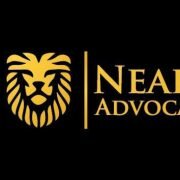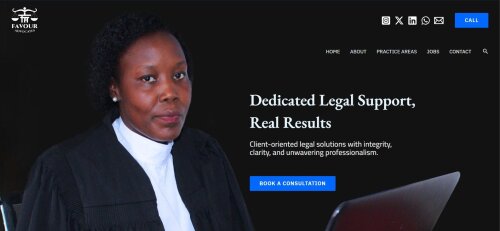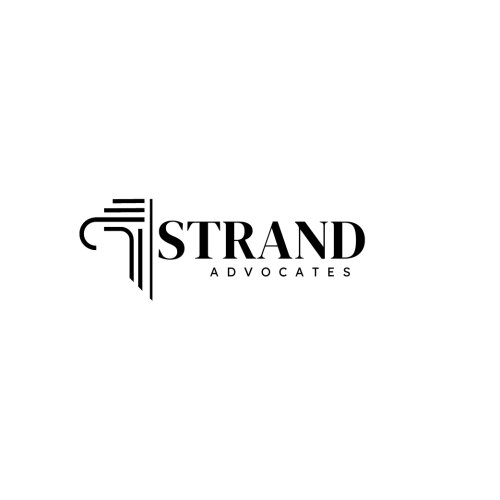Best Elder Abuse Law Lawyers in Uganda
Share your needs with us, get contacted by law firms.
Free. Takes 2 min.
Or refine your search by selecting a city:
List of the best lawyers in Uganda
About Elder Abuse Law in Uganda
Elder abuse in Uganda is recognized as a serious issue that encompasses physical, emotional, financial, and even sexual abuse, as well as neglect of older adults. Uganda's framework for elder abuse law aims to protect senior citizens from maltreatment by providing legal avenues for redress and ensuring their welfare through various statutes and policies.
While Uganda does not have a single comprehensive statute exclusively dedicated to elder abuse, relevant provisions are scattered across existing laws and policies focused on human rights, domestic violence, and social welfare. The Ugandan Constitution, Penal Code Act, and Domestic Violence Act, among others, play crucial roles in safeguarding the rights and dignity of the elderly population.
Why You May Need a Lawyer
There are several situations where engaging a lawyer might be necessary in elder abuse cases especially given the complexities in navigating the legal system. Common scenarios include:
- Suspected physical abuse, resulting in injury or trauma to an elderly person.
- Emotional abuse that affects the mental well-being of a senior.
- Financial exploitation or fraud targeting senior citizens.
- Neglect by caregivers or family members leading to harm or diminished quality of life.
- Seeking protection orders or restraining orders against abusive individuals.
- Mediating family disputes involving the care and well-being of an older adult.
Legal guidance is crucial to accurately document abuse, file complaints with law enforcement, and effectively advocate for the rights of the elderly in judicial proceedings.
Local Laws Overview
The key aspects of elder abuse law in Uganda are primarily covered under different existing statutes:
- The Constitution of Uganda: Provides broad human rights protections that can be availed by the elderly, ensuring dignity and protection against discrimination or harm.
- The Penal Code Act: Outlines various offenses including assault, grievous harm, and more, which can be pertinent in cases of physical abuse.
- The Domestic Violence Act: Offers mechanisms to address domestic abuse, which often includes the abuse of older people within family settings.
- The Local Government Act: Provides for local councils that can be instrumental in community-based interventions for resolving elder abuse situations.
Frequently Asked Questions
1. What constitutes elder abuse under Ugandan law?
Elder abuse can include physical, emotional, financial, or sexual harm, as well as neglect and abandonment of older adults.
2. How can I report elder abuse in Uganda?
Reports can be made to local authorities, police stations, or social welfare offices. Engaging a lawyer can also help in efficiently filing and following up on a complaint.
3. What legal protections exist for elderly victims of abuse?
Laws such as the Domestic Violence Act provide measures such as protection orders. The Penal Code also addresses various forms of abuse as punishable offenses.
4. Can elder abuse cases be settled outside of court?
Some cases, especially those involving familial disputes, may be resolved through mediation or community dispute resolution mechanisms.
5. What role do local councils play in addressing elder abuse?
Local councils can assist in mediating disputes, facilitating access to social services, and ensuring community-level enforcement of protections for the elderly.
6. Is legal aid available for elder abuse cases?
Yes, government and non-governmental organizations offer legal aid services, especially for vulnerable populations like the elderly.
7. Are there penalties for those found guilty of elder abuse?
Yes, penalties can range from fines to imprisonment, depending on the severity and nature of the abuse, as outlined in the Penal Code and other relevant legislation.
8. Do I need a lawyer to file a case of elder abuse?
While not mandatory, having a lawyer can significantly aid in navigating legal processes and ensuring comprehensive advocacy for the victim's rights and interests.
9. How long do the legal proceedings take in elder abuse cases?
The duration of legal proceedings can vary significantly based on the complexity of the case and the efficiency of the legal system.
10. Can abuse occur in institutional settings such as care homes?
Yes, elder abuse can occur in all settings, including residential care facilities, and should be reported and addressed under the law.
Additional Resources
For those seeking help or more information, the following resources may be of assistance:
- Ministry of Gender, Labour, and Social Development: Oversees social services and welfare programs for the elderly.
- The Uganda Human Rights Commission: Offers avenues for reporting rights violations and abuse cases.
- Legal Aid Clinics: Provided by organizations such as the Uganda Law Society, offering free legal services.
- Local NGOs focused on elder rights and protection, offering advocacy and support services.
Next Steps
If you or someone you know is experiencing elder abuse, it's important to take action. Consider the following steps:
- Document any evidence of abuse, including photographs, medical records, and witness accounts.
- Report the abuse to local authorities or seek assistance from a legal aid organization.
- Consult with a lawyer who specializes in elder abuse law to understand your rights and options.
- Explore community resources or support groups for additional help and guidance.
Taking prompt and informed action is crucial to protecting the rights and well-being of the elderly and ensuring justice is served.
Lawzana helps you find the best lawyers and law firms in Uganda through a curated and pre-screened list of qualified legal professionals. Our platform offers rankings and detailed profiles of attorneys and law firms, allowing you to compare based on practice areas, including Elder Abuse Law, experience, and client feedback.
Each profile includes a description of the firm's areas of practice, client reviews, team members and partners, year of establishment, spoken languages, office locations, contact information, social media presence, and any published articles or resources. Most firms on our platform speak English and are experienced in both local and international legal matters.
Get a quote from top-rated law firms in Uganda — quickly, securely, and without unnecessary hassle.
Disclaimer:
The information provided on this page is for general informational purposes only and does not constitute legal advice. While we strive to ensure the accuracy and relevance of the content, legal information may change over time, and interpretations of the law can vary. You should always consult with a qualified legal professional for advice specific to your situation.
We disclaim all liability for actions taken or not taken based on the content of this page. If you believe any information is incorrect or outdated, please contact us, and we will review and update it where appropriate.
Browse elder abuse law law firms by city in Uganda
Refine your search by selecting a city.














